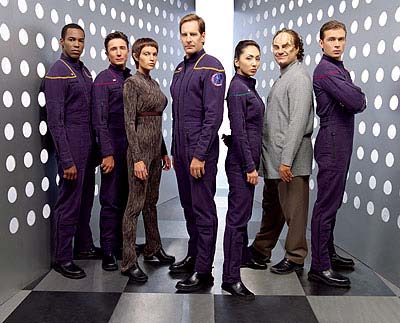My Favorite Films of 2004
To make a “best” list of pretty much anything is a fruitless and arbitrary effort in what is always, in the end, nothing more than personal preference. And yet we do it all the time. I am going to call my list “favorites” instead, thereby completely bypassing this accusation and fooling everyone into believing that I am completely and totally impartial and ruled only by a strict regard for art and cinematic technique.
While I frequently deviate to one degree or another with the Academy Award nominees, I have never been more at odds with their choices than this year. Sure, I think some are well deserved, but for the most part, the films that truly moved and influenced me over the last year are not on their list. Moreover, one of my selections is blatantly blockbuster fodder—and I don’t apologize in the slightest for naming it one of the year’s best. My utterly favorite film is no where near a Best Picture nomination and, in fact, was generally lambasted as one of the worst films of the year. I am, of course, talking about…
1) THE VILLAGE

The most misunderstood and unappreciated film of the year.
Those critics who lambasted M. Night Shyamalan’s “The Village” must have seen a different movie than I saw. They must have missed my version that used the idea of an isolated village as a gorgeous metaphor for the dangers of control through fear, noble deception for “good,” the overriding power of myth, and the ugliness just under the veneer of a supposed utopia. They must have seen a different version that didn't deal with the fact that evil is a part of our world and you cannot escape it, no matter how well you hide yourself—sorrow and sin are within us all and you can never outrun yourself. They were unaware of the flip side of that truth—that alongside the evil rests kindness and mercy and that these traits are everywhere, even where we least expect them. They were ignorant of the universal desire for the collective myth that blissful simplicity and overarching goodness somehow existed in a past we’ve left behind.
These critics must have slept through the most beautiful cinematography this year—camerawork and direction so original and so evocative of time and place that one is lost in the visual narrative without hope of escape. And just when you think you have caught it cracking, you come to discover it has done so intentionally. They must have missed the fine acting and the beautifully minimalist love story that is a far greater emphasis of the film than the horror the trailers want you to believe.
No film this year raised more questions or forced audiences to confront the wickedness posing as righteousness in our modern world more than “The Village.” Too bad those same audiences were more interested in cheep parlor tricks to care.
2) FINDING NEVERLAND
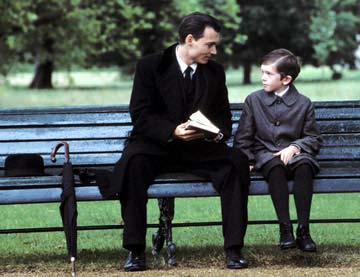
“Finding Neverland” is a small, gentle, graceful motion picture that reminds us that it is still utterly important—essential even—that as adults, we never lose our grasp of the inner child buried and suffocating within all of us. Using the story of author J.M. Barrie’s inspiration for the writing of the classic, Peter Pan, “Finding Neverland” is a whimsical and delicate reminder that there is more to the world than we can see, that innocence is valuable and fragile, that it is essential to hang on to the belief that there is something that transcends the empirical world. Newcomer Freddie Highmore will break your heart with his performance as young Peter.
3) THE PASSION OF THE CHRIST
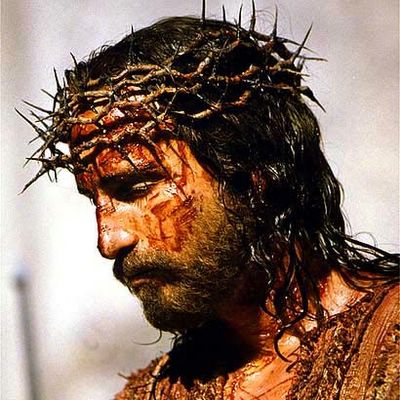
“The Passion of the Christ” was divisive and controversial. How one related to it depended on what one brought into the theater. Powerful, evocative, nauseating and harrowing, “The Passion” was Mel Gibson’s love letter to the most loving act toward humankind ever recorded. That this love should have been manifested in one of history’s most gory human sacrifices was just one of the many spiritual paradoxes this film so brilliantly reflected.
4) ETERNAL SUNSHINE OF THE SPOTLESS MIND

There is a scene in the abysmal “Star Trek V: The Final Frontier” in which Captain James T. Kirk, when offered the possibility of having all the painful memories of his life erased, states emphatically, “Damn it, Bones, you're a doctor. You know that pain and guilt can't be taken away with a wave of a magic wand. They're the things we carry with us, the things that make us who we are. If we lose them, we lose ourselves. I don't want my pain taken away. I need my pain.” This is a realization that Jim Carrey will make during “Eternal Sunshine of the Spotless Mind” after trying to have the painful memories of a devastating breakup erased from his mind.
The film is a strange, quirky, dreamy trip that is both thoughtful and relentlessly creative. Sometimes bizarre, sometimes poignant, it is always thought-provoking. Its ultimate message—that love must be unconditional—is one of which we could all use more. Growth and true intimacy come only after we accept the faults and flaws of others and choose to love them in spite of it. It is only this sort of love that will overcome the first flush of infatuation and see us through life’s many hardships.
How ironic it is that a film about erasing memories is one I can't stop thinking about.
5) SIDEWAYS

“Sideways” is a joy to behold, from beginning to end. Peppered with moments of deep sadness, biting authenticity, profound truth, and even uproarious slapstick, this year’s independent darling (last year’s was the luminescent “Lost in Translation”, my favorite film of last year) is a winner despite its impossible chances at taking home an Oscar for Best Picture. Taking the conventions of the traditional “road trip” movie, Director Alexander Payne weaves an original and charming story about two friends, one a loser and the other a loathsome playboy, and the women they meet along the way.
These are not the sort of characters we admire for their morality, but that doesn’t stop us from developing an affection for them and even seeing shades of ourselves in their derailed lives. The script’s delicate use of wine as a metaphor for human beings, describing grapes in the way people might describe themselves, is breathtaking. This is the sort of film you’ll want to see again and again.
6) SPIDER-MAN II
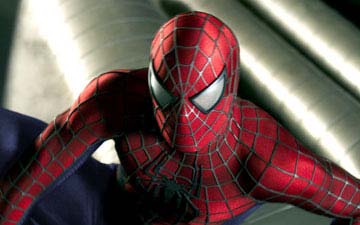
One of the best superhero movies ever made (alongside 1978’s “Superman”, 1989’s “Batman” and 2003’s “X-2”), Spider-Man II easily eclipses its predecessor both artistically and philosophically.
Director Sam Raimi perfectly captures the angst of Peter Parker and his pot-holed passage to balancing great power with great responsibility. By focusing on the human rather than the superhuman, the audience relates to Parker’s struggles and identifies with him as a character of absolute believability—even while he crawls up walls and swings between the skyscrapers of downtown Manhattan.
Relentlessly fun, packed with razor-sharp humor, and shining with nearly IMAX nauseating first-rate special effects, “Spider-Man II” builds a meaningful story from its characters (even producing a villain that earns both our respect and sympathy) and shrouds it in symbolism that is overtly Christian in nature.
7) THE MOTERCYCLE DIARIES

While “The Passion of the Christ” may have been the year’s most literal and boldest portrayal of Christ in film, the one that made the biggest impact on me was a film about a historical figure many in the West have been taught to despise—Ernesto “Che” Guevara.
Focusing on Guevara’s young life before he became the revolutionary leader we know him as today, “The Motorcycle Diaries” is another “road trip” movie that depicts the adventures and mishaps of two best friends who set out to see South America from the back of a rickety motorbike. The trip opens the eyes of the young, middle-class medical student and sets the stage for him to abandon his life of privilege in order to help the poor and downtrodden. The reflection of Christ seen in Che’s love of those suffering in a leper colony and his willingness to reach out and touch them when no one else will is the high-point of a movie that is nothing short of a cinematic feast.
8) HOUSE OF FLYING DAGGERS/HERO
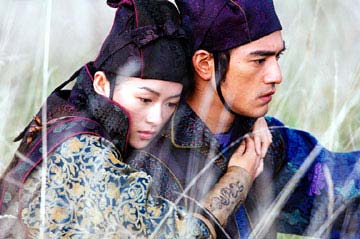
Wuxia Pian films as they are known in China, the sort of action films like “Crouching Tiger, Hidden Dragon” that skip bending the laws of physics in order to go straight to utterly shattering them, do not require that one suspends belief—they demand that we utterly surrender it. Reality is secondary to aesthetic. Truth is always subordinate to beauty. Only in abandoning oneself to the power of the visual poetry is a higher plane of reality accepted and embraced.
In “House of flying Daggers” and “Hero,” (both of which debuted ages ago but took years to make their way to American appetites) director Zhang Yimou delivers audaciously beautiful, improbable, exuberant martial arts feasts set in feudal China. What the films may lack philosophically, they more than make up for in the breath-catching beauty and grace of their aerial ballets.
9) THE AVIATOR
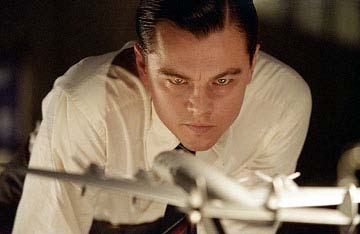
After the gorgeous but atrocious “Gangs of New York,” the great Martin Scorsese has made his best film since “Goodfellas.” This hugely enjoyable biopic rises to the top of the pack in a season awash with historical biographies. This is a fascinating character study about a man who succeeded in spite of failure, and failed despite his success. Howard Hughes was a man who walked the knife’s edge between equal doses of genius and madness, and everything and everybody he touched reflect this juxtaposition.
The film spans the billionaire's most prolific period from the mid 20s through the 40s, skipping his most meteoric decent into later-life insanity. A giant of a personality, Hughes breathes life into epic films, epic aircraft, and epic women. Unwaveringly mesmerizing and riveting, the film boasts some of the best performances of the year, especially the brilliant Leonardo DiCaprio as Hughes and Cate Blanchett as the irrepressible Katharine Hepburn.
10) ?

I’m going to leave this one blank. Why? Aside from the nagging and persistent worry that I stupidly overlooked an obvious and earlier-designated candidate, there are many acclaimed films this year that I simply did not have the chance to yet see (“Kinsey,” “Vera Drake,” “Closer,” “Super Size Me,” “Before Sunset,” “The Life Aquatic With Steve Zissou,” “Dogville,” etc.) Perhaps one of them will one day soon be added here…
Honorable Mentions include: “Million Dollar Baby,” “Garden State,” “Fahrenheit 9/11,” “In Good Company,” “Hotel Rwanda,” “Saved,” “Kill Bill II,” “The Polar Express,” “Collateral,” “Sky Captain And The World Of Tomorrow,” “The Incredibles,” “Maria Full Of Grace,” “Harry Potter and the Prisoner Of Azkaban.”
While I frequently deviate to one degree or another with the Academy Award nominees, I have never been more at odds with their choices than this year. Sure, I think some are well deserved, but for the most part, the films that truly moved and influenced me over the last year are not on their list. Moreover, one of my selections is blatantly blockbuster fodder—and I don’t apologize in the slightest for naming it one of the year’s best. My utterly favorite film is no where near a Best Picture nomination and, in fact, was generally lambasted as one of the worst films of the year. I am, of course, talking about…
1) THE VILLAGE

The most misunderstood and unappreciated film of the year.
Those critics who lambasted M. Night Shyamalan’s “The Village” must have seen a different movie than I saw. They must have missed my version that used the idea of an isolated village as a gorgeous metaphor for the dangers of control through fear, noble deception for “good,” the overriding power of myth, and the ugliness just under the veneer of a supposed utopia. They must have seen a different version that didn't deal with the fact that evil is a part of our world and you cannot escape it, no matter how well you hide yourself—sorrow and sin are within us all and you can never outrun yourself. They were unaware of the flip side of that truth—that alongside the evil rests kindness and mercy and that these traits are everywhere, even where we least expect them. They were ignorant of the universal desire for the collective myth that blissful simplicity and overarching goodness somehow existed in a past we’ve left behind.
These critics must have slept through the most beautiful cinematography this year—camerawork and direction so original and so evocative of time and place that one is lost in the visual narrative without hope of escape. And just when you think you have caught it cracking, you come to discover it has done so intentionally. They must have missed the fine acting and the beautifully minimalist love story that is a far greater emphasis of the film than the horror the trailers want you to believe.
No film this year raised more questions or forced audiences to confront the wickedness posing as righteousness in our modern world more than “The Village.” Too bad those same audiences were more interested in cheep parlor tricks to care.
2) FINDING NEVERLAND

“Finding Neverland” is a small, gentle, graceful motion picture that reminds us that it is still utterly important—essential even—that as adults, we never lose our grasp of the inner child buried and suffocating within all of us. Using the story of author J.M. Barrie’s inspiration for the writing of the classic, Peter Pan, “Finding Neverland” is a whimsical and delicate reminder that there is more to the world than we can see, that innocence is valuable and fragile, that it is essential to hang on to the belief that there is something that transcends the empirical world. Newcomer Freddie Highmore will break your heart with his performance as young Peter.
3) THE PASSION OF THE CHRIST

“The Passion of the Christ” was divisive and controversial. How one related to it depended on what one brought into the theater. Powerful, evocative, nauseating and harrowing, “The Passion” was Mel Gibson’s love letter to the most loving act toward humankind ever recorded. That this love should have been manifested in one of history’s most gory human sacrifices was just one of the many spiritual paradoxes this film so brilliantly reflected.
4) ETERNAL SUNSHINE OF THE SPOTLESS MIND

There is a scene in the abysmal “Star Trek V: The Final Frontier” in which Captain James T. Kirk, when offered the possibility of having all the painful memories of his life erased, states emphatically, “Damn it, Bones, you're a doctor. You know that pain and guilt can't be taken away with a wave of a magic wand. They're the things we carry with us, the things that make us who we are. If we lose them, we lose ourselves. I don't want my pain taken away. I need my pain.” This is a realization that Jim Carrey will make during “Eternal Sunshine of the Spotless Mind” after trying to have the painful memories of a devastating breakup erased from his mind.
The film is a strange, quirky, dreamy trip that is both thoughtful and relentlessly creative. Sometimes bizarre, sometimes poignant, it is always thought-provoking. Its ultimate message—that love must be unconditional—is one of which we could all use more. Growth and true intimacy come only after we accept the faults and flaws of others and choose to love them in spite of it. It is only this sort of love that will overcome the first flush of infatuation and see us through life’s many hardships.
How ironic it is that a film about erasing memories is one I can't stop thinking about.
5) SIDEWAYS

“Sideways” is a joy to behold, from beginning to end. Peppered with moments of deep sadness, biting authenticity, profound truth, and even uproarious slapstick, this year’s independent darling (last year’s was the luminescent “Lost in Translation”, my favorite film of last year) is a winner despite its impossible chances at taking home an Oscar for Best Picture. Taking the conventions of the traditional “road trip” movie, Director Alexander Payne weaves an original and charming story about two friends, one a loser and the other a loathsome playboy, and the women they meet along the way.
These are not the sort of characters we admire for their morality, but that doesn’t stop us from developing an affection for them and even seeing shades of ourselves in their derailed lives. The script’s delicate use of wine as a metaphor for human beings, describing grapes in the way people might describe themselves, is breathtaking. This is the sort of film you’ll want to see again and again.
6) SPIDER-MAN II

One of the best superhero movies ever made (alongside 1978’s “Superman”, 1989’s “Batman” and 2003’s “X-2”), Spider-Man II easily eclipses its predecessor both artistically and philosophically.
Director Sam Raimi perfectly captures the angst of Peter Parker and his pot-holed passage to balancing great power with great responsibility. By focusing on the human rather than the superhuman, the audience relates to Parker’s struggles and identifies with him as a character of absolute believability—even while he crawls up walls and swings between the skyscrapers of downtown Manhattan.
Relentlessly fun, packed with razor-sharp humor, and shining with nearly IMAX nauseating first-rate special effects, “Spider-Man II” builds a meaningful story from its characters (even producing a villain that earns both our respect and sympathy) and shrouds it in symbolism that is overtly Christian in nature.
7) THE MOTERCYCLE DIARIES

While “The Passion of the Christ” may have been the year’s most literal and boldest portrayal of Christ in film, the one that made the biggest impact on me was a film about a historical figure many in the West have been taught to despise—Ernesto “Che” Guevara.
Focusing on Guevara’s young life before he became the revolutionary leader we know him as today, “The Motorcycle Diaries” is another “road trip” movie that depicts the adventures and mishaps of two best friends who set out to see South America from the back of a rickety motorbike. The trip opens the eyes of the young, middle-class medical student and sets the stage for him to abandon his life of privilege in order to help the poor and downtrodden. The reflection of Christ seen in Che’s love of those suffering in a leper colony and his willingness to reach out and touch them when no one else will is the high-point of a movie that is nothing short of a cinematic feast.
8) HOUSE OF FLYING DAGGERS/HERO

Wuxia Pian films as they are known in China, the sort of action films like “Crouching Tiger, Hidden Dragon” that skip bending the laws of physics in order to go straight to utterly shattering them, do not require that one suspends belief—they demand that we utterly surrender it. Reality is secondary to aesthetic. Truth is always subordinate to beauty. Only in abandoning oneself to the power of the visual poetry is a higher plane of reality accepted and embraced.
In “House of flying Daggers” and “Hero,” (both of which debuted ages ago but took years to make their way to American appetites) director Zhang Yimou delivers audaciously beautiful, improbable, exuberant martial arts feasts set in feudal China. What the films may lack philosophically, they more than make up for in the breath-catching beauty and grace of their aerial ballets.
9) THE AVIATOR

After the gorgeous but atrocious “Gangs of New York,” the great Martin Scorsese has made his best film since “Goodfellas.” This hugely enjoyable biopic rises to the top of the pack in a season awash with historical biographies. This is a fascinating character study about a man who succeeded in spite of failure, and failed despite his success. Howard Hughes was a man who walked the knife’s edge between equal doses of genius and madness, and everything and everybody he touched reflect this juxtaposition.
The film spans the billionaire's most prolific period from the mid 20s through the 40s, skipping his most meteoric decent into later-life insanity. A giant of a personality, Hughes breathes life into epic films, epic aircraft, and epic women. Unwaveringly mesmerizing and riveting, the film boasts some of the best performances of the year, especially the brilliant Leonardo DiCaprio as Hughes and Cate Blanchett as the irrepressible Katharine Hepburn.
10) ?

I’m going to leave this one blank. Why? Aside from the nagging and persistent worry that I stupidly overlooked an obvious and earlier-designated candidate, there are many acclaimed films this year that I simply did not have the chance to yet see (“Kinsey,” “Vera Drake,” “Closer,” “Super Size Me,” “Before Sunset,” “The Life Aquatic With Steve Zissou,” “Dogville,” etc.) Perhaps one of them will one day soon be added here…
Honorable Mentions include: “Million Dollar Baby,” “Garden State,” “Fahrenheit 9/11,” “In Good Company,” “Hotel Rwanda,” “Saved,” “Kill Bill II,” “The Polar Express,” “Collateral,” “Sky Captain And The World Of Tomorrow,” “The Incredibles,” “Maria Full Of Grace,” “Harry Potter and the Prisoner Of Azkaban.”


